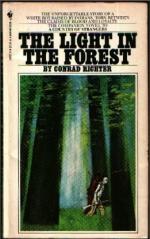|
This section contains 229 words (approx. 1 page at 400 words per page) |

|
The Light in the Forest Summary & Study Guide Description
The Light in the Forest Summary & Study Guide includes comprehensive information and analysis to help you understand the book. This study guide contains the following sections:
This detailed literature summary also contains Further Study and a Free Quiz on The Light in the Forest by Conrad Richter.
The Light in the Forest addresses universal issues of survival, individual freedom, divided loyalties, and identity through the personal drama of True Son, a fifteen-year-old boy caught between two cultures. Born to European settlers, True Son was abducted by Native Americans when he was four years old. He has grown to love and respect his "adopted" parents; forced to return to his biological family as an adolescent, True Son faces a crisis of identity and purpose.
True Son's individual struggle points to the larger territorial conflict between the early pioneers and Native Americans. As an adventure story, the novel depicts both the white and Native American characters as complex individuals; as a historical account, the story presents the characters as representations of the political loyalties and racial biases of their own groups. Richter openly confronts the issue of racial biases among ethnic groups and encourages cultural sensitivity; The Light in the Forest emphasizes cooperation and respect for the values of others as the only means of ensuring a peaceful society in the future. Forced to choose between his white and Native American families, True Son ultimately rejects both and instead chooses to regard himself as an individual and to provide an example of peace and justice. Through True Son's story Richter extends a message of racial harmony in the United States and peace and understanding among nations.
Read more from the Study Guide
|
This section contains 229 words (approx. 1 page at 400 words per page) |

|



